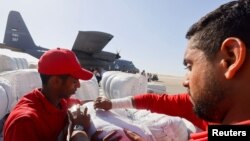Top U.N. humanitarian and political officials are at the Rafah crossing between Egypt and Gaza, negotiating to end the stalemate that has prevented the delivery of humanitarian aid for hundreds of thousands of Palestinians who have been under siege since Hamas militants attacked Israel October 7.
“They are in touch with Egyptian authorities, with everybody who can help to get humanitarian needs into Gaza,” Alessandra Vellucci, director of the U.N. Information Office in Geneva, told journalists Friday.
She said U.N. Secretary-General Antonio Guterres was in Egypt with Under-Secretary-General for Humanitarian Affairs Martin Griffiths and Under-Secretary-General for Political Peacebuilding Affairs Rosemary DiCarlo, trying to get a large convoy of relief supplies massed at the border moving into Gaza.
“What has to be made clear is that they are doing what they can to have a sustained humanitarian access and a flow of aid that gets into the country in a steady way, a sufficient way, and a safe way,” she said.
U.S. President Joe Biden brokered a deal between Egypt and Israel to allow a 20-truck humanitarian aid convoy to enter Gaza Friday. That convoy has been delayed, reportedly because of needed road repairs.
However, the Office for the Coordination of Humanitarian Affairs said it believed that is likely to be a temporary setback.
“We are indeed in advanced negotiations with all relevant sides to ensure that an aid operation into Gaza starts as quickly as possible, with the right conditions,” said Jens Laerke, Humanitarian Affairs spokesperson.
“We are encouraged by reports that the different sides are nearing an agreement on the modalities and that a first delivery is due to start in the next day or so,” he said, noting that there needs to be unhindered humanitarian access of food, water, fuel and medicine into Gaza.
However, Israel will not allow fuel, which Laerke calls a lifesaving commodity, to enter Gaza, noting that the territory has been under a full power blackout for nine days, with no electricity or fuel to run generators in hospitals.
In a situation report issued Friday, the U.N. Relief and Works Agency for Palestine Refugees, or UNRWA, warned that the lack of fuel was compounding the already dire conditions in Gaza.
“The water crisis continues due to the inability to bring in much needed fuel, which is needed to operate water pumps and desalination plants. … Health-related risks due to the lack of water and poor sanitation are growing, including water-borne and other diseases.
“Fuel stocks in the functional health centers are also depleted, hampering the provision of primary health care in UNRWA’s health centers,” it said.
Before the assault by Hamas, followed by Israel’s siege of Gaza, people with chronic diseases, who needed treatment outside the Palestinian occupied territories could get permission to cross into Israel or Rafah.
“Normally, we would have had several hundred people going out of Gaza every day for advanced medical care,” said Margaret Harris, World Health Organization spokesperson.
“Now, with many of the hospitals, at least five hospitals, not functioning … we have many, many people with chronic conditions, who are not getting care,” she said.
According to the Ministry of Health in Gaza, 3,785 people have been killed and another 12,493 injured since October 7. OCHA puts the number of people killed in Israel at 1,300, with at least 4,562 wounded.
The Office of the High Commissioner for Human Rights has urged all parties to allow the rapid and unimpeded passage of humanitarian relief for all civilians in need.
Human rights officials expressed concern about the continued indiscriminate rockets being fired from Gaza. They also deplored Israel’s continued bombardment in both the southern and northern parts of Gaza, making it difficult, if not impossible for people to find safety.
“There are fuel shortages. People are not able to move as well for logistical reasons in addition of their fear of violence, of being hit by strikes,” said Ravina Shamdasani, the high commissioner’s spokesperson.
“When the evacuation order had been issued by Israel calling on the population to move down south, there were, of course, counter orders issued by Palestinian armed groups, calling on them not to move.
“So, again you had civilians caught in the middle of insanity and placed in impossible situations. Whether they moved, whether they stayed, they are still in the midst of unacceptable violence at all times,” she said.







